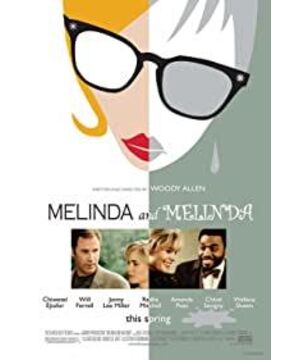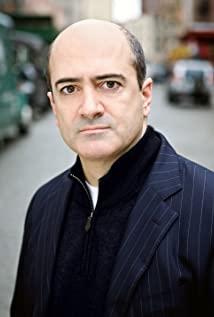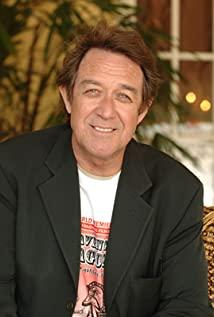On a rainy day in New York, three men and a woman chattered about the philosophical issue of "whether life is a comedy or a tragedy" in a cafe. A typical Woody Allen-style intellectual talk scene.
Serious men think that people need tragedy more because it confronts reality and allows us to better deal with life's dilemmas. The humorous man believes that it is precisely because the reality is difficult, so the audience is more willing to choose comedy, let themselves get out of life and achieve a short escape.
The same story begins: "A woman named Melinda breaks into a house party." Two men with different ideas, decide to imagine and tell the story in the direction of comedy and tragedy, respectively.
Woody Allen is always keen on this kind of "Zhou Botong-style left and right hand fight" game. Zoom in on the conversation fragments in life, and express abstract philosophical thinking through the imagination of movies. A forked path, he decided to let the same figure try to walk in both directions.
After many years of marriage, Meilinda had a lover, and her husband sued for divorce after finding out. When she made up her mind to start a new life with her lover, she found out that he had cheated on him. In a fit of rage, she killed her lover, was convicted of schizophrenia by the court, and lost her right to visit her two children.
The same life background, similar story trends, breaking into parties, arranging blind dates, meeting new lovers... But because of different handling methods and interpretation angles, there are joys and sorrows.
In both stories, Melinda is a disgraced intrusion. In the tragic version, the camera is aimed at the disheveled and mentally distraught Melinda. The focus on collapse allows the tragic image to emerge. In the comedy version, Malinda is also in a bad situation, but the camera is more focused on the surrounding environment. Melinda's misfortune becomes lighthearted.
After breaking in, they all tell their unfortunate past. On one side of the camera, Melinda, whose eyes were out of focus and full of anger, kept getting closer, and she told her sad past little by little. On the other side, a group of people surrounded her, listening to her speech, staggering their opinions, mixing various voices, drinking and clinking glasses and chewing food. Even if someone is talking about sad things, it is a lively scene. Thus, the audience is again induced by the camera, and has a different emotion.
It's like shooting a passerby falling down, aiming at the wound has a tragic atmosphere, and aiming at the watermelon rind has a comedy color. Outside the camera, Woody Allen can be seen smiling slyly and saying, Look, this can be a tragic story. But with a little bit of tricks and a sneaky bit of detail, I can turn it into a comedy in no time.
But he occasionally deliberately confuses the boundaries of the two stories, making the audience wonder, is this a comedy or a tragedy?
So, Woody Allen's answer when the film was met with bad reviews was: "If you don't like the movie, you can go out of the theater and find a place to satisfy your appetite. However, I hope that those who walk out of the theater will be able to In a few minutes, think about the context of life, and you will find that there is a line between joy and sorrow."
Both stories have a plot of a handicraft magic lamp. In the tragic story, Melinda rubs the magic lamp, praying that life can get better quickly. In the comedy story, the married man who fell in love with Meilinda made a wish on the magic lamp. I wanted to be with Meilinda without hurting my wife.
Woody Allen gave these fantasies a good drink through the mouth of his wife in the film: "Be careful, life is not what you make a wish by wiping a magic lamp."
After Melinda broke into the house party, she also broke into the couple's life. In both stories, she meets a black pianist and quickly falls in love. Tragically, the pianist later fell in love with the wife, and Milinda suffered another emotional breakdown. In the tragic imagination, people are African drums, and the blows of life, one superimposes the other, and collapses one after another.
In comedy stories, life is made up of accidents, and in coincidences, humorously leads to consummation. Melinda falls in love with a pianist, only to discover she prefers the married man upstairs. And that husband also likes her, and is making a wish on the magic lamp for his moral struggle.
The magic lamp fulfilled his wish, and his wife moved out quickly after having an extramarital affair. He finally didn't have to hurt his wife and could be with Melinda. Melinda, who was downstairs, lived in the bedroom upstairs, and the two talked and kissed on the sofa, and the comedy ended successfully.
The picture returns to the cafe, as an imagination for entertainment, and after talking about it, it falls into the cliché of chicken soup summary, "It's no big deal, whether it's comedy or tragedy, it's your own views on life. Nothing in this world is absolute. ."
A few friends finished telling stories and raised their glasses. Tonight is really relaxing and enjoyable. In the end, I have to toast to the good life, whether it is a comedy or a tragedy. Woody Allen was out of the camera, holding up his black-rimmed glasses and smiling wickedly.
View more about Melinda and Melinda reviews











